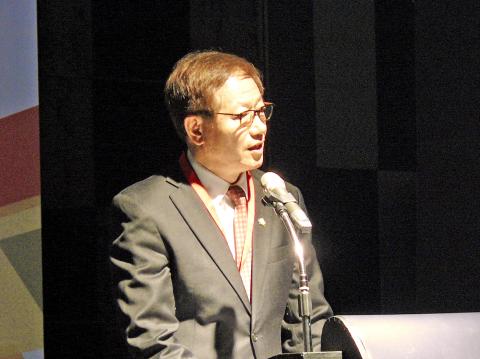Taiwan Semiconductor Manufacturing Co (TSMC, 台積電) yesterday said it plans to start initial chip production using cutting-edge 5-nanometer technology in 2019, possibly allowing the company to pull ahead of peers.
TSMC this year entered the technology development phase for 5-nanometer technology, company co-chief executive officer Mark Liu (劉德音) told the chipmaker’s annual supply chain management forum.
The Hsinchu-based firm has about 6,000 research and development (R&D) personnel working on the development of 5-nanometer technology, Liu said.

Photo: CNA
“TSMC has set a high and aggressive target as its [5-nanometer] technology road map shows,” Clark Tseng (曾瑞榆), a senior semiconductor analyst with Semiconductor Equipment and Materials International, said by telephone. “It is likely that TSMC will lead its competitors in ramping 5-nanometer technology, as no clear road map has been disclosed by Samsung Electronics yet.”
TSMC this year plans to increase R&D spending by 15 percent from last year, alongside a capital expenditure of US$10 billion, to boost its technology leadership, Liu said.
The chipmaker spent US$2.21 billion on R&D last year, the company’s financial statement showed.
TSMC has also tasked several hundred R&D personnel with the initial development of 3-nanometer technology and is evaluating a fab site for 3-nanometer chip production, he added.
“We are optimistic about 3-nanometer” development, Liu said.
As for 7-nanometer technology, Liu said the company is confident that it will stay ahead of its major competitors in ramping up chip production using the advanced technology.
TSMC is to start initial chip production using 7-nanometer technology at the end of this quarter, followed by mass production next year.
Regarding 10-nanometer technology, Liu said 3,000 engineers and 1,500 technicians are working to ship a small volume of chips this quarter.
The volume will increase rapidly from the second quarter, he said.
TSMC has reportedly been tapped as a major chip supplier using the 10-nanometer technology for Apple Inc’s new iPhone models.
The company declined to comment on the reports.
Solid technological capabilities have helped TSMC gain a 65 to 70 percent share of the world’s 16-nanometer chip market and 80 percent share of the 28-nanometer chip market, the firm said.
South Korean rival Samsung Electronics Co yesterday launched its first Exynos processor built on the company’s 10 nanometer FinFet process technology, the company said in a statement.
The advanced processor is in mass production, it said.

‘SWASTICAR’: Tesla CEO Elon Musk’s close association with Donald Trump has prompted opponents to brand him a ‘Nazi’ and resulted in a dramatic drop in sales Demonstrators descended on Tesla Inc dealerships across the US, and in Europe and Canada on Saturday to protest company chief Elon Musk, who has amassed extraordinary power as a top adviser to US President Donald Trump. Waving signs with messages such as “Musk is stealing our money” and “Reclaim our country,” the protests largely took place peacefully following fiery episodes of vandalism on Tesla vehicles, dealerships and other facilities in recent weeks that US officials have denounced as terrorism. Hundreds rallied on Saturday outside the Tesla dealership in Manhattan. Some blasted Musk, the world’s richest man, while others demanded the shuttering of his

Taiwan’s official purchasing managers’ index (PMI) last month rose 0.2 percentage points to 54.2, in a second consecutive month of expansion, thanks to front-loading demand intended to avoid potential US tariff hikes, the Chung-Hua Institution for Economic Research (CIER, 中華經濟研究院) said yesterday. While short-term demand appeared robust, uncertainties rose due to US President Donald Trump’s unpredictable trade policy, CIER president Lien Hsien-ming (連賢明) told a news conference in Taipei. Taiwan’s economy this year would be characterized by high-level fluctuations and the volatility would be wilder than most expect, Lien said Demand for electronics, particularly semiconductors, continues to benefit from US technology giants’ effort

TIGHT-LIPPED: UMC said it had no merger plans at the moment, after Nikkei Asia reported that the firm and GlobalFoundries were considering restarting merger talks United Microelectronics Corp (UMC, 聯電), the world’s No. 4 contract chipmaker, yesterday launched a new US$5 billion 12-inch chip factory in Singapore as part of its latest effort to diversify its manufacturing footprint amid growing geopolitical risks. The new factory, adjacent to UMC’s existing Singapore fab in the Pasir Res Wafer Fab Park, is scheduled to enter volume production next year, utilizing mature 22-nanometer and 28-nanometer process technologies, UMC said in a statement. The company plans to invest US$5 billion during the first phase of the new fab, which would have an installed capacity of 30,000 12-inch wafers per month, it said. The

ADVERSARIES: The new list includes 11 entities in China and one in Taiwan, which is a local branch of Chinese cloud computing firm Inspur Group The US added dozens of entities to a trade blacklist on Tuesday, the US Department of Commerce said, in part to disrupt Beijing’s artificial intelligence (AI) and advanced computing capabilities. The action affects 80 entities from countries including China, the United Arab Emirates and Iran, with the commerce department citing their “activities contrary to US national security and foreign policy.” Those added to the “entity list” are restricted from obtaining US items and technologies without government authorization. “We will not allow adversaries to exploit American technology to bolster their own militaries and threaten American lives,” US Secretary of Commerce Howard Lutnick said. The entities